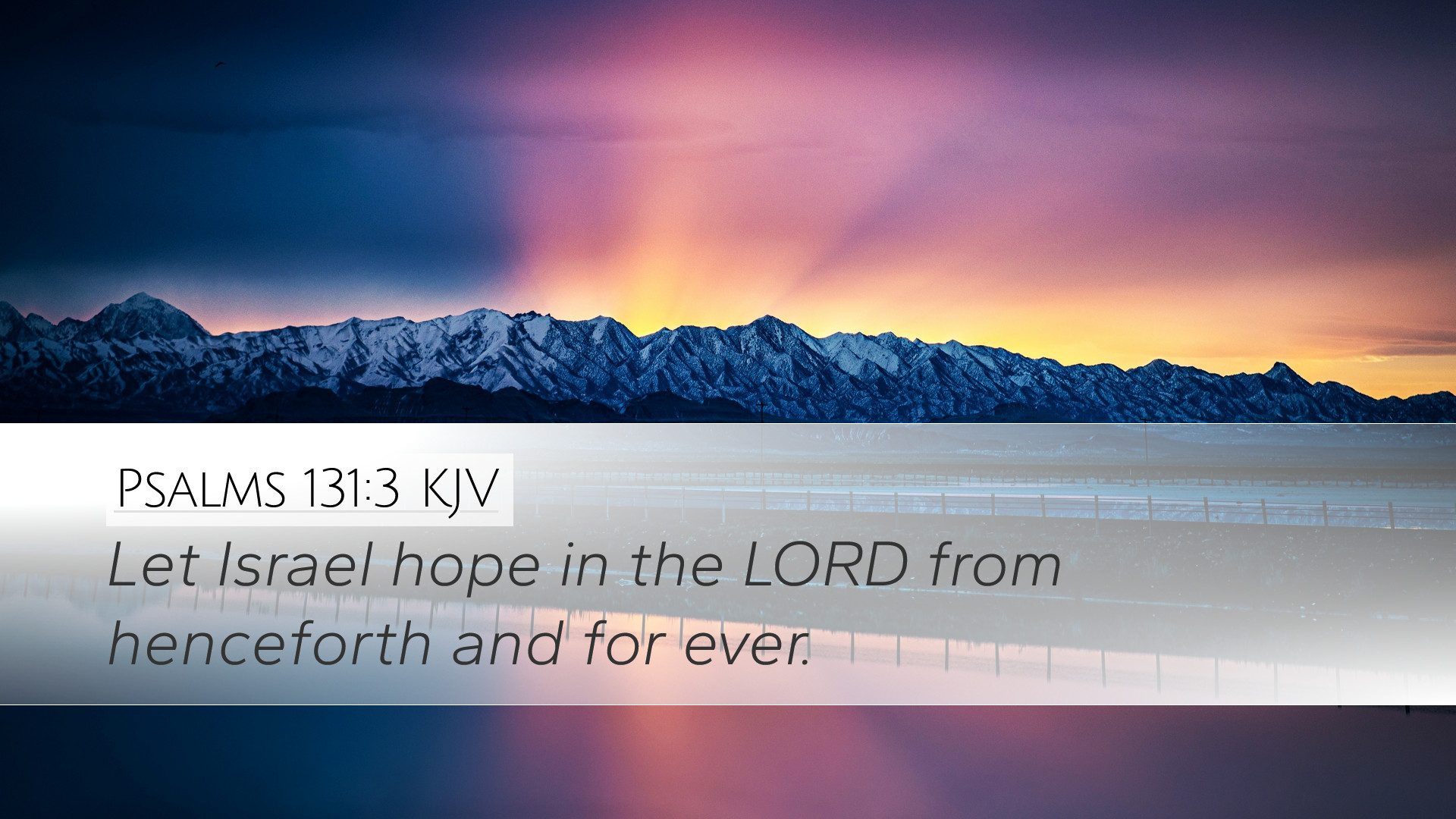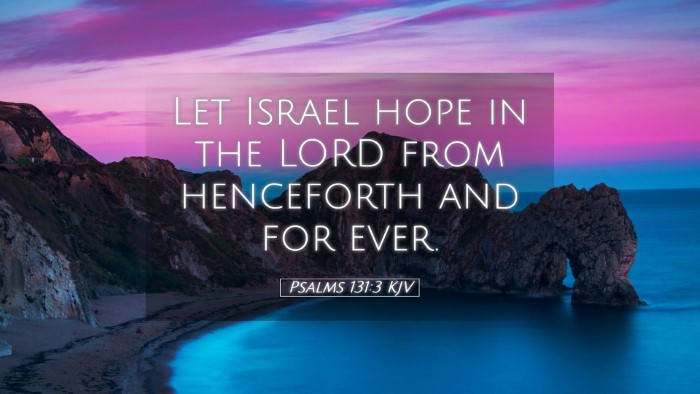Psalms 131:3 Commentary
Text of Psalms 131:3 (KJV): "Let Israel hope in the LORD from henceforth and forever."
Contextual Overview
This verse is a part of a short psalm attributed to David, which pertains to the theme of humility and trust in God's providence. It serves as a conclusion to the thoughts articulated in the previous verses, emphasizing the necessity of a deep, unwavering hope in the Lord. Various commentaries draw on different aspects of this hope and its implications for Israelites and believers today.
Insights from Matthew Henry
Matthew Henry offers a profound reflection on the nature of hope directed towards God. He emphasizes that true hope is not merely a wishful thinking but is rooted in faith and trust in God’s character and promises. Henry explains that this verse is a call for the people of Israel to place their complete confidence in the Lord, abandoning any reliance on human wisdom or strength.
He notes that the call to "hope in the Lord" suggests a future expectation of God's faithfulness, and it serves as both a comfort and a responsibility. Henry asserts that such hope brings peace and stability to the soul, especially amid trials, reinforcing the believer's understanding that God's grace and mercy are constant.
Albert Barnes' Perspective
Albert Barnes elaborates on the communal aspect of hope in this verse. He explains that "Let Israel hope in the LORD" is not an isolated exhortation but an invitation to the entire community of Israel. Barnes emphasizes the collective nature of faith and reliance on God, urging the people to unite in their hope and share in the assurance that the Lord is their refuge and strength.
Furthermore, Barnes highlights the implications of hope being extended "from henceforth and forever." This expression calls for an ongoing, enduring trust that transcends immediate circumstances. According to Barnes, believers should cultivate a long-term perspective, recognizing that God's promises endure through all generations.
Adam Clarke’s Exegesis
Adam Clarke provides a nuanced interpretation of the phrase “hope in the LORD.” He underscores that hope implies a level of faith and reliance that requires a proactive stance from the believer. Clarke indicates that this hope is not passive but active, encompassing both a longing for God's presence and a commitment to live in obedience to His will.
Additionally, Clarke emphasizes the word "let," which suggests a volitional action. He encourages believers to make a conscious decision to place their hope in God, highlighting the importance of personal agency in the life of faith. In his analysis, Clarke observes that the call to hope is a decisive act of the will, inviting individuals to fully engage with their faith.
Thematic Implications
- Hope as a Central Theme: Across the commentaries, the emphasis on hope resonates with the broader biblical narrative that characterizes hope as essential for spiritual life. This verse reiterates the importance of expecting God's intervention and delivering power.
- Community of Believers: The communal aspect of hope highlighted by commentators emphasizes the need for mutual encouragement within the church. Pastors and leaders are reminded of their role in fostering an environment where collective hope can thrive.
- Long-term Perspective: The repeated call to hope indefinitely encourages believers to adopt a posture of faith that looks beyond the temporal. This perspective empowers believers to confront difficulties with a sense of expectation rooted in the eternal nature of God’s faithfulness.
Practical Applications
For pastors, students, and scholars, the reflections on Psalms 131:3 offer several practical applications:
- Preaching and Teaching: When preaching, leaders can integrate the call to hope into their messages, assuring congregations of God’s lasting faithfulness.
- Community Building: Strategies should be developed to cultivate hope within congregations, fostering environments where community members encourage one another in their faith journeys.
- Personal Reflection: Individuals are encouraged to personally reflect on their understanding of hope and to examine areas where they might be relying on human efforts rather than divine assistance.
Conclusion
Psalms 131:3 encapsulates a rich theological understanding of hope, intertwined with themes of humility, community, and everlasting faithfulness. Insights from renowned commentators provide depth to the text, challenging believers to engage actively with their faith. In a world full of uncertainties, the call to hope in the Lord remains a foundational principle for life, inspiring both individual and communal expressions of trust in God’s unfailing love and mercy.


